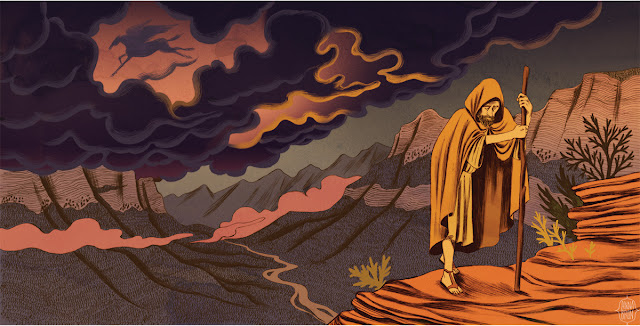BELLEROPHON, a grandson of Sisyphus, was a great tamer of horses. He would have given all he owned for a ride on the winged horse Pegasus, who had sprung out of Medusa's neck.
Pegasus had flown to Greece, where the nine Muses had found him and tended him. They were the only ones who could come close enough to touch him, for Pegasus was wild and swift.
One night, Bellerophon fell asleep in Athena's temple. He dreamed that the goddess gave him a golden bridle that would make the flying horse tame. And when he awoke, he really held a golden bridle in his hand.
Not long thereafter, Pegasus flew over Corinth, saw the clear spring that Sisyphus had won from the river-god, and stopped to drink. Carefully Bellerophon tiptoed up to the winged horse and flung the bridle over his head. The horse neighed, looked at Bellerophon, and suddenly he was so tame that Bellerophon could mount him. Never had there been such a horse and such a horseman. They galloped through the air, over land and over sea, faster than the wind.
On the back of his flying horse, Bellerophon set off to fight the Chimera, a fire-breathing beast that was ravaging the kingdom of Lycia in Asia Minor. The Chimera was more fearful than a nightmare. She was lion in front, serpent in back, and goat in between. She spat fire from all her three heads and her hide was so tough that no weapon could pierce it. Swooping down as close as he dared without singeing the coat of his flying horse, Bellerophon went at the monster with a lump of lead stuck to the end of his spear. The Chimera hissed like a serpent, bleated like a goat, and as she opened wide her lion's jaws to roar, he thrust the lump of lead down her throat. Her flaming breath melted the lead and it trickled into her stomach and killed her.
The people of Lycia, who had been hiding in fear behind bolted doors, now dared to come out, and the king of the country was so thankful that he gave Bellerophon the hand of his daughter. When the old king died, Bellerophon inherited the kingdom. He became a great king, loved by his people, feared by his neighbors and all the monsters lurking nearby. But his fame went to his head and he grew so vain that he thought he was as great as the gods. He even held himself equal to Zeus. He soared ever higher on his flying horse, and at last he tried to enter Olympus itself. There pride took a spill. Pegasus threw him and Bellerophon fell to earth, landing in thistle thorns in a distant country. Torn and lame, he wandered about as an unknown beggar until he died. Pegasus entered Olympus alone and Zeus made the handsome winged horse the carrier of his thunderbolts.
Pegasus had flown to Greece, where the nine Muses had found him and tended him. They were the only ones who could come close enough to touch him, for Pegasus was wild and swift.
One night, Bellerophon fell asleep in Athena's temple. He dreamed that the goddess gave him a golden bridle that would make the flying horse tame. And when he awoke, he really held a golden bridle in his hand.
Not long thereafter, Pegasus flew over Corinth, saw the clear spring that Sisyphus had won from the river-god, and stopped to drink. Carefully Bellerophon tiptoed up to the winged horse and flung the bridle over his head. The horse neighed, looked at Bellerophon, and suddenly he was so tame that Bellerophon could mount him. Never had there been such a horse and such a horseman. They galloped through the air, over land and over sea, faster than the wind.
On the back of his flying horse, Bellerophon set off to fight the Chimera, a fire-breathing beast that was ravaging the kingdom of Lycia in Asia Minor. The Chimera was more fearful than a nightmare. She was lion in front, serpent in back, and goat in between. She spat fire from all her three heads and her hide was so tough that no weapon could pierce it. Swooping down as close as he dared without singeing the coat of his flying horse, Bellerophon went at the monster with a lump of lead stuck to the end of his spear. The Chimera hissed like a serpent, bleated like a goat, and as she opened wide her lion's jaws to roar, he thrust the lump of lead down her throat. Her flaming breath melted the lead and it trickled into her stomach and killed her.
The people of Lycia, who had been hiding in fear behind bolted doors, now dared to come out, and the king of the country was so thankful that he gave Bellerophon the hand of his daughter. When the old king died, Bellerophon inherited the kingdom. He became a great king, loved by his people, feared by his neighbors and all the monsters lurking nearby. But his fame went to his head and he grew so vain that he thought he was as great as the gods. He even held himself equal to Zeus. He soared ever higher on his flying horse, and at last he tried to enter Olympus itself. There pride took a spill. Pegasus threw him and Bellerophon fell to earth, landing in thistle thorns in a distant country. Torn and lame, he wandered about as an unknown beggar until he died. Pegasus entered Olympus alone and Zeus made the handsome winged horse the carrier of his thunderbolts.


Comments
Post a Comment